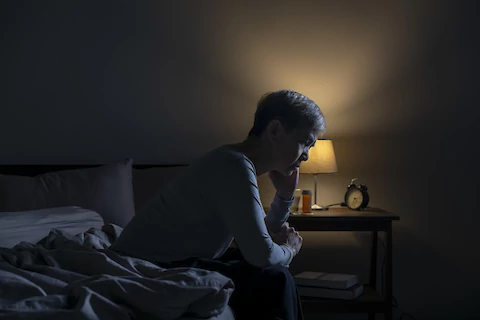
Dementia is a challenging condition affecting seniors worldwide. It not only impacts memory and cognitive function but also causes sleep disturbances in seniors that can take a toll on their overall health and well-being.
Family caregivers need to understand the strategies for handling these sleep disturbances to ensure seniors have the best quality of life possible.
Managing Nighttime Restlessness
One effective strategy in mitigating sleep disturbances is to help seniors establish a consistent daily routine that incorporates regular physical activity.
Engaging in mild to moderate exercise, such as walking or gardening, can contribute to better sleep quality. Be mindful of daytime naps, as excessive napping can disrupt the sleep-wake cycle. This can make it harder for seniors to fall asleep at night. It's also important to introduce relaxation techniques, like deep breathing exercises or meditation, to promote calmness before bedtime. Additionally, maintaining consistency in sleep and wake times is crucial to ensure a healthy sleep pattern.
Creating a Soothing Bedtime Routine
A calming bedtime routine can signal to seniors that it is time for rest. Consider incorporating activities like reading a book, listening to soft music, or having a warm, non-caffeinated beverage together. Avoid stimulating activities such as watching television or using electronic devices, as these can interfere with the body's natural sleep signals. It's also important to monitor seniors' caffeine and sugar intake in the evening, as these substances can contribute to sleeplessness.
Adapting the Sleeping Environment
Creating a comfortable and conducive sleeping environment can greatly enhance sleep quality. Invest in a supportive mattress and pillows to ensure optimal comfort. Keep the bedroom cool, dark, and clutter-free, as a clean environment can promote relaxation.
If necessary, reduce noise levels with the use of a fan, white noise machine, or earplugs. Additionally, provide a sense of security with night lights or motion-activated lights. These can help seniors navigate the space safely when they need to get up during the night.
Addressing Underlying Health Issues or Medications
Family caregivers must also stay attuned to seniors' overall health, as underlying illnesses or medications may contribute to their sleep disturbances. Consult with a healthcare professional to identify potential causes and discuss any concerns regarding medication side effects. Treatment for common sleep disorders, like sleep apnea or restless leg syndrome, may also help improve sleep quality. Make sure to address any pain or discomfort seniors are experiencing that could be affecting their rest.
When to Consider Seeking Professional Help
Be vigilant in recognizing when sleep disturbances are significantly impacting seniors' quality of life or your well-being as a caregiver. You can consider exploring options for in-home care or respite care services. Seeking guidance from a geriatric care specialist or joining a support group for caregivers of seniors with dementia can provide valuable resources and advice.
Senior Helpers Solano-Yolo-City of Sacramento Provides Care for Seniors With Dementia
Addressing sleep disturbances in seniors with dementia plays a vital role in maintaining their overall health and well-being. By implementing these strategies and staying attuned to their needs, you can help support your loved one in achieving a restful night's sleep.
If you're living in Sacramento, Solano County, Fairfield, Vacaville, Davis, or Winters and are seeking professional assistance, consider Senior Helpers Solano-Yolo-City of Sacramento for compassionate and expert care for your loved one with dementia. Contact us today to learn more about our services.